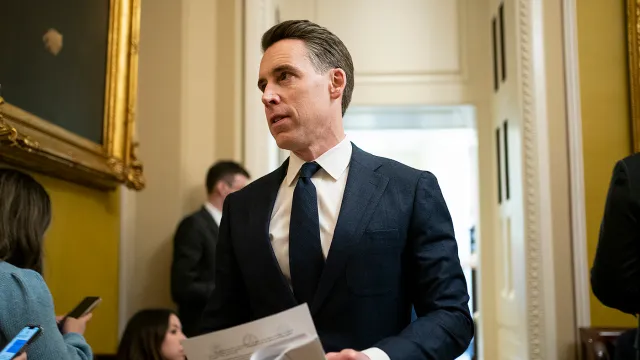Senator Josh Hawley (R-MO) introduced the American Worker Rebate Act. The bill would deliver rebate checks to U.S. families using tariff revenue generated under President Donald Trump’s trade policies.
The White House is reporting that tariffs have brought in $150 billion in revenues so far. Projections are over $300 billion for 2025. Hawley says it’s time for working Americans—not Washington insiders or foreign governments—to benefit from this surge.
“Like President Trump proposed, my legislation would allow hard-working Americans to benefit from the wealth that Trump’s tariffs are returning to this country,” Hawley said on Monday.
How the Rebate Would Work
The American Worker Rebate Act would establish a direct payment program funded by tariffs:
- $600 per adult and dependent child, meaning a family of four would receive at least $2,400.
- Larger checks if tariff revenues exceed projections for 2025.
- Phase-outs for high-income households: $150,000 for couples, $75,000 for single filers.
Unlike past stimulus payments, this plan doesn’t rely on borrowing or new taxes. Funds come straight from tariffs foreign companies pay to access the U.S. market.
Trump: “The Big Money Starts August 1”
President Trump emphasized that tariff revenue is just getting started, saying:
“The big money will start coming in on August 1. I think it was made clear today by the letters that were sent out yesterday and today.”
To keep America in control, Trump signed an Executive Order extending key tariff rates to August 1, 2025. He also notified dozens of countries of their new reciprocal rates. These actions came after months of talks where some nations ignored warnings of higher tariffs, while others agreed to lower their own tariffs and cut trade barriers.
Despite this progress, Trump says the U.S. trade deficit remains unacceptable. He seeks to continue to bring countries to the table to negotiate, protecting U.S. interests.
Boost from the New U.S.–EU Trade Deal
Tariff revenue is set to climb even higher thanks to a landmark trade deal with the European Union. This week, Trump finalized an agreement that will:
- Adopt a new tariff framework: 15% tariffs on autos, auto parts, pharmaceuticals, and semiconductors.
- Maintain 50% tariffs on steel, aluminum, and copper.
This deal is expected to funnel billions more into U.S. Treasury accounts, adding to the funding source for Hawley’s proposed rebate checks.
Historic Trade Victories Under Trump
This rebate proposal builds on what many call one of the most successful trade negotiations in U.S. history.
For decades, past presidents failed to secure fair trade agreements with Europe. These failures allowed trade imbalances to harm U.S. industry. Trump changed that. In just six months, he achieved a historic trade breakthrough with the EU, resetting the economic relationship between the world’s two largest economies.
His leadership has revived U.S. manufacturing, attracted global investment, and made America an energy powerhouse. What others promised for decades, Trump delivered—restoring the nation’s role as the global standard-bearer for economic leadership and strength.
The U.S.–EU deal is a win for American workers, farmers, inventors, and businesses of all sizes. This proves that bold, decisive leadership can reverse years of stagnant growth and reclaim prosperity for future generations.
Supporters Say It’s Time to Pay Families Back
Supporters argue the rebate is long-overdue payback for American families. They say in the past, Washington has:
- Had lopsided trade deals that worked against Americans.
- Wasted trillions on foreign aid, bloated agencies, and benefits for illegal immigrants.
- Failed to protect U.S. workers and middle-class families for decades.
Tariffs now generate unprecedented revenue. Supporters believe this money should go back to citizens, not into the hands of bureaucrats or foreign governments.
The Other Side of the Rebate Debate: Pay Down the Debt First
Not every conservative agrees with Hawley’s proposal. Many fiscal hawks argue that with the national debt at $36.72 trillion, new payments are irresponsible.
They insist every dollar of extra revenue should reduce the deficit, not create new spending. Interest costs are already consuming taxpayer funds. Handing out checks could push inflation higher, repeating mistakes made during pandemic-era stimulus programs.
Debt-focused conservatives say fiscal discipline must come first. Only after the U.S. gets its finances under control, they argue, should extra funds be returned to taxpayers.
Treasury Reports Stronger Finances
Trump administration officials counter that tariff revenue is already strengthening the budget, making rebates possible without harming fiscal health.
Treasury Secretary Scott Bessent told Maria Bartiromo on Fox Business on June 22nd: “We’ve brought in nearly $100B in tariff revenue so far and are on track for $300B this year. That’s almost 1% of GDP. June delivered a budget surplus with higher revenue and lower spending. This is how we clean up the fiscal mess we inherited.”
Supporters say this surplus proves tariffs can fund rebates and reduce deficits at the same time, undermining claims that the plan is reckless.
We’ve brought in nearly $100B in tariff revenue so far and are on track for $300B this year. That’s almost 1% of GDP. June delivered a budget surplus with higher revenue and lower spending.
This is how we clean up the fiscal mess we inherited. pic.twitter.com/JVfaj1ZAwU
— Treasury Secretary Scott Bessent (@SecScottBessent) July 22, 2025
Political Fight Ahead Over Rebate
Hawley’s proposal faces a challenging path in Congress. Many lawmakers from both parties prefer to keep tariff funds for pet projects, foreign aid, or deficit spending.
But the idea is popular with voters, many of whom have endured high prices, high interest rates, and stagnant wages over the last four years. Trump’s backing makes the proposal a likely centerpiece in upcoming trade and economic debates, forcing lawmakers to take a clear stand.
Bottom Line: Washington’s Choice
Trump’s tariffs are generating historic sums. Hawley wants that money to go straight to U.S. families, not disappear into Washington’s bureaucracy or be sent overseas.
Supporters call it long-overdue payback for decades of failed policies that hurt American workers. Critics say the nation must tackle its $36.72 trillion debt first.
As Hawley presses forward, Congress faces a simple choice: use Trump’s trade revenue wisely or keep funding the same broken system.
Do you think Americans deserve this rebate? The debate is on, and lawmakers are deciding what to do with record tariff revenue. Share this article and join the conversation.


